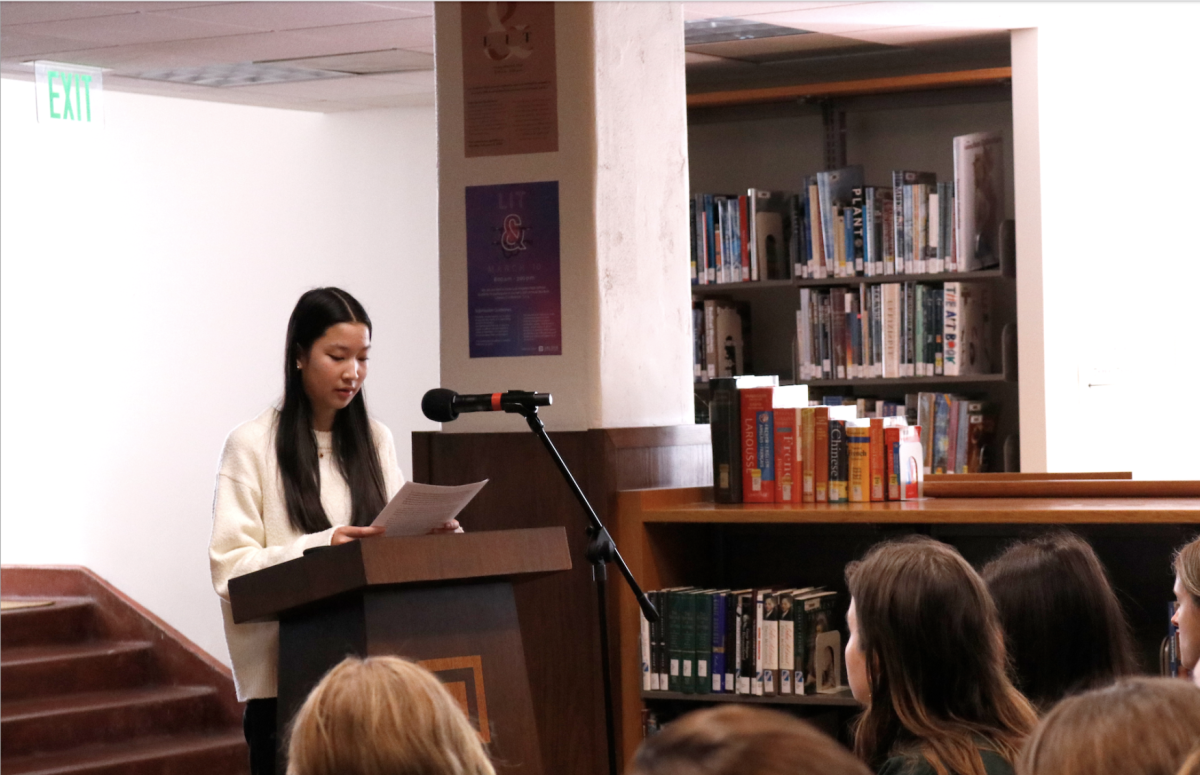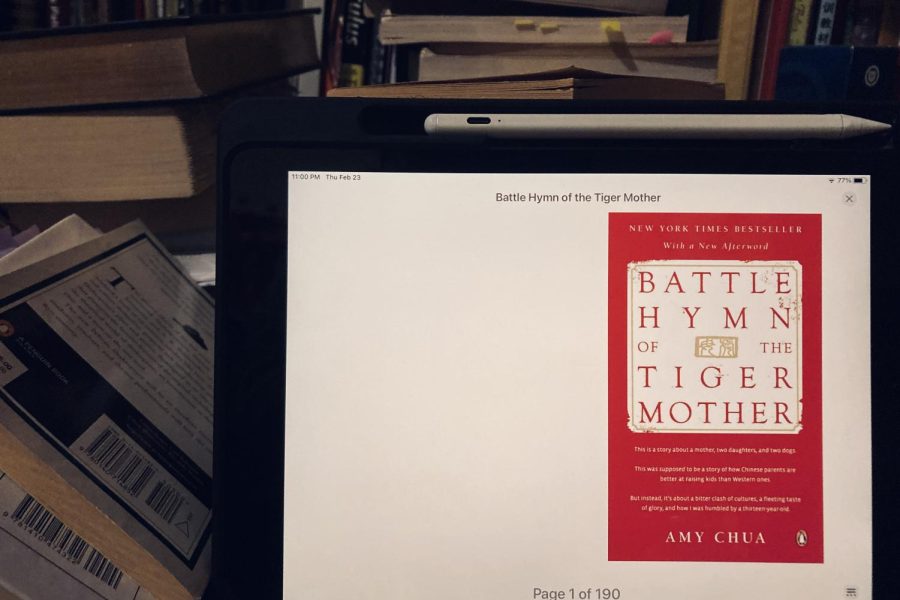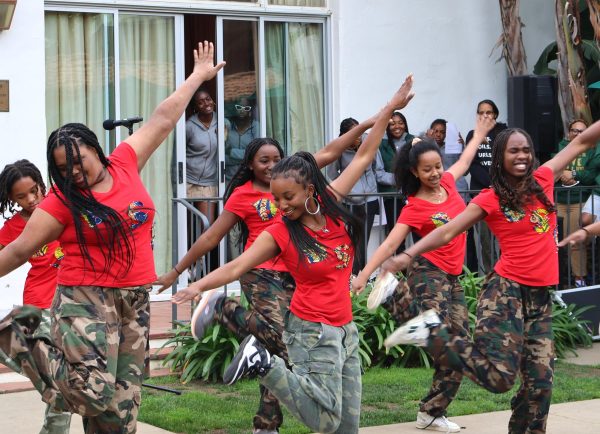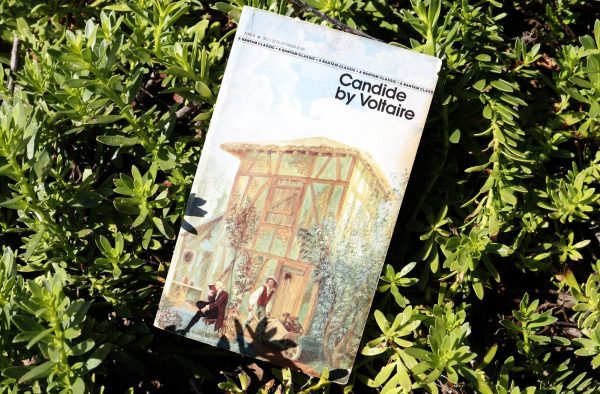Review: ‘Battle Hymn of the Tiger Mother’ is a tale of a tiger mother’s transformation
Photo credit: Melinda Wang
Amy Chua’s book, “Battle Hymn of the Tiger Mother,” is displayed on my iPad. Chua’s novel forms an impact on the reader that is equally as powerful in its digital format as it is in its physical format.
March 15, 2023
The term “tiger mother” was coined by Amy Chua in her book “Battle Hymn of the Tiger Mother” in 2011. Before then, there existed the “helicopter parent” and the “lighthouse parent,” but there never was a term that described the strict and academically oriented parenting style as well as “tiger mother”. Despite the controversy associated with Chua’s book and the phrase “tiger mother,” there undoubtedly is an important conversation to be had with both students and parents on the subject of academic and cultural expectations. While “Battle Hymn of the Tiger Mother” focuses more on Chua’s personal life, the book does an excellent job of preparing the reader for that conversation.
Dictionary.com defines a tiger mother as “a strict mother, especially an East Asian, who demands academic excellence and obedience from her children.“
Author Amy Chua defines herself as a tiger mother. Chua is from a Chinese background and in her memoir “Battle Hymn of the Tiger Mother”, she writes about her “Chinese” parenting methods and how her children behaved in return. Chua details her own experiences as a tiger mother and adds research about the pros and cons of Eastern and Western parenting styles. The “Chinese” teaching methods Chua discusses in her book are meant to encapsulate the general idea of strict teaching methods in different countries.
Throughout my reading of the book, I often felt like I was peering outside my own fishbowl, meaning peering outside of the Chinese culture I thought I always knew. When Chua’s fear of her daughters being lazy and unmotivated led her to push them extremely hard, I was conflicted. As a Chinese American with lenient Chinese parents, I did not know whether or not this was how the majority of Chinese parents acted, or if Chua was an outlier — an extreme case of a strict parent.
Before discovering “Battle Hymn of the Tiger Mother,” I read Chua’s essay, “Why Chinese Mothers Are Superior,” and I knew I wanted to learn more about the educational aspect of Asian culture. As someone who has not been impacted by the rigidness of academic expectations, I was curious about Chua’s rigid parenting style as a tiger mother. When I found out Chua’s article was excerpted from her memoir, I immediately began searching for her book.
Chua sets her readers up with an adequate amount of background information. She provides context for her own actions and mindset, and I like this aspect of her writing. For example, Chua describes how it is crucial for a parent to override a child’s personal preferences, which she described as using “the Chinese strategy”.
What Chua defines as the “Chinese strategy” is that non-stop practicing activities like ballet, basketball or violin produces praise from others, and that praise motivates a child to work more on something they’re excelling at. Chua elaborates by writing how Western parents often give up overriding their child’s preferences, while Chinese parents are more strict so their children can be more successful in a particular activity.
Many critics found faults in Chua’s strict parenting methods and role as a tiger mother, but Chua wrote in the afterword that “Battle Hymn of the Tiger Mother” was supposed to serve as a a satirical memoir celebrating rebellion and the different dynamics in family and culture.
Towards the beginning of the book, Chua writes that she threatened to burn the stuffed animals of her eldest daughter if she didn’t perform a piano piece perfectly. Chua also focuses on how, over the years, she pushed her youngest daughter so hard with the violin, she rebelled against the firm expectations she had set. Lulu’s rebellion as the book progresses becomes an anchor for the reader to understand how Chua’s view on parenting has shifted as well.
For example, Chua admitted that the “Chinese strategy” didn’t work Lulu and that such rigid expectations aren’t expected to work on every child. Towards the ending of the book, Chua learns to grant Lulu the freedom to explore her own passions, which is a trait typically associated with Western culture.
I found this development to be both heartwarming and alleviating. It brought me hope to see how Chua, as a tiger mother, recognized both the consequences and the benefits of her teaching methods, and also learned to tweak them in accordance with her daughters. I also think the shift in her teaching dynamic plays a homage to Chua’s role as a tiger mother. Through the novel she often compares herself to a tiger, in that tiger mothers aren’t always tigers. They are also mothers.
When I read the conclusion of the book I realized I was more comfortable with my role as an outsider looking into this entirely foreign concept of education. I felt I was able to grow alongside Chua in her understanding of her true intentions as a tiger mother, and I discovered that tiger mothers can learn to embrace more of their “motherly” side.
Overall, I enjoyed the book’s readability and how vulnerable and truthful Chua was in telling her story, despite its controversial views on how children should be raised. “Battle Hymn of the Tiger Mother” added to my understanding of the duality in my identity as a Chinese American and the academic expectations associated with Eastern cultures. One moment in particular was when Chua writes of her own childhood and details how she was raised within the strict expectations in her home.
-
Writing
-
Story
-
Purpose
-
Credibility
-
Enjoyment
Summary
“Battle Hymn of the Tiger Mother” is a satirical memoir that explores Chua’s personal experience with raising her children as a tiger mother. Chua navigates themes of persistence and growth, while delving into the struggles of raising her two children, with her husband and two dogs.




![Freshman Milan Earl and sophomore Lucy Kaplan sit with their grandparents at Archer’s annual Grandparents and Special Friends Day Friday, March 15. The event took place over three 75-minute sessions. “[I hope my grandparents] gain an understanding about what I do, Kaplan said, because I know they ask a lot of questions and can sort of see what I do in school and what the experience is like to be here.](https://archeroracle.org/wp-content/uploads/2024/03/grandparents-day-option-2-1200x800.jpg)





























































